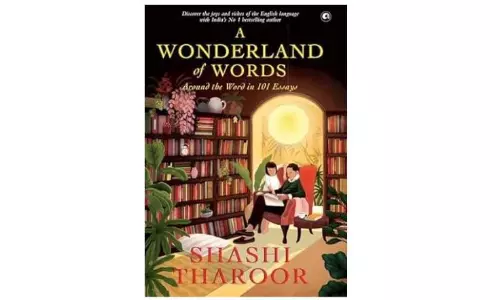Book Review | Grasping the ineffable magic of words!
Shashi Tharoor, author, former diplomat, long-serving parliamentarian, is known as much for his distinguished public life as he is for his often arcane vocabulary. In 2018 he famously tweeted that his book on Narendra Modi, “The Paradoxical Prime Minister is more than just a 500-page exercise in floccinaucinihilipilification’’. That eye-watering word, which made people run to their dictionaries, means an act of estimating something or someone as worthless.
There are other such Tharoorisms that have launched a thousand memes. But as he says in the introduction to A Wonderland of Words: Around the World in 101 Essays, he has always taken the jokes in his stride. This book shows that his love of words in the English language extends far beyond his occasional sesquipedalian salvos that leave us slack-jawed. Indeed, the work is a testament to Tharoor’s prodigious knowledge of the language, its words and their usage and etymology, their charm and their quirks, all of which is narrated in a delightfully illustrative and witty style.
The book cuts a wide swathe — from examples of foreign words that have permeated into the English language, to the differences between American English and British English, to the peculiarities of Indian English, to the pitfalls of wrong punctuation and the utterly irrational rules of English spelling and pronunciation. Tharoor also dwells on the more obscure figures of speech and literary devices that one had perhaps learnt at school, but had pretty much forgotten about. For instance, you may know what a palindrome is or what constitutes a hyperbole. But do you know the meaning of paraprosdokians? Or bacronym? Or about the rule of ablautreduplication?
If these words seem like they’re straight out of Tharoor’s lexical playbook, fear not. There is much here to engage even those who do not have a burning desire to bone up on stuff like dysphemisms (an unpleasant synonym like, say, loony bin for a mental hospital) or anaphora (the repetition of a word or phrases at the beginning of successive clauses). Then there are interesting backstories of words and phrases such as the ubiquitous ‘OK’ or ‘riff-raff’ or ‘pass the buck’ or idioms like ‘beating around the bush’; examples of awkwardly crafted — and hence hilarious — newspaper headlines which are called ‘crash blossoms’, by the way (read the book to find out why), and Wodehousian coinages that every fan of the inimitable PGW will re-read with delight.
Tharoor has little patience with the current language of over-the-top political correctness wherein a felon needs to be called a ‘justice-involved person’ or the word ‘male’ replaced with the acronym AMAB (assigned male at birth). While it is important to be sensitive to race and gender in one’s choice of words, he says, don’t take the language of equity so far that it båecomes an exercise in absurdity and destroys the beauty and grace of the English language.
A logophile like Shashi Tharoor could hardly have felt otherwise.
Shuma Raha is a journalist and author
A Wonderland of Words: Around the World in 101 Essays
By Shashi Tharoor
Aleph
pp. 470; Rs 999



